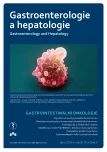-
Medical journals
- Career
Modified FOLFIRINOX in the treatment of pancreatic cancer – efficiency and toxicity
Authors: M. Vočka; L. Petruželka
Authors‘ workplace: Onkologická klinika 1. LF UK a VFN v Praze
Published in: Gastroent Hepatol 2016; 70(5): 413-417
Category: Gastrointestinal Oncology: Original Article
doi: https://doi.org/10.14735/amgh2016413Overview
Introduction:
Pancreatic cancer represents ~2% of all cancers (6% of all cancer deaths). The therapeutic results at all stages of the disease are worse than those of other solid tumours.Methods:
Analysis was conducted of 47 patients treated for advanced pancreatic cancer between January 2013 and July 2016 at the Department of Oncology of the First Faculty of Medicine and General University Hospital in Prague. Patients were treated with a modified FOLFIRINOX regimen with 75% reduction (oxaliplatine 85 mg/sqm, irinotecane 180 mg/sqm, leucovorine 400 mg/sqm, bolus of 5-fluorouracile 400 mg/sqm, and continual infusion of 5-fluorouracile 2,400 mg/sqm for 46 hours every two weeks) without primary prophylaxis with hematopoietic growth factors as the first line of therapy. The antitumour efficacy (number of objective responses, time to progression, and overall survival) and adverse events were monitored.Results:
The median time to progression was 6.5 months (10.1 months in patients with locally advanced disease; n = 18). The best observed response was complete remission in two cases and partial admission in 13 cases according to RECIST. Operability was achieved in four (22.2%) of 18 patients with locally advanced pancreatic cancer. The median overall survival was 17.6 months from diagnosis of inoperable locally advanced or generalized tumours.Conclusion:
In patients with advanced pancreatic cancer and a good performance status (0–1), FOLFIRINOX may significantly prolong time to progression and overall survival with good quality of life.Key words:
pancreatic cancer – FOLFIRINOX – efficiency – toxicity
The authors declare they have no potential conflicts of interest concerning drugs, products, or services used in the study.
The Editorial Board declares that the manuscript met the ICMJE „uniform requirements“ for biomedical papers.Submitted:
1. 9. 2016Accepted:
6. 10. 2016
Sources
1. Informační systém pro analytické zpracování dat Národního onkologického registru. [online]. Dostupné z: www.svod.cz.
2. Cowgill SM, Muscarella P. The genetics of pancreatic cancer. Am J Surg 2003; 186 (3): 279–286.
3. Hidalgo M. Pancreatic Cancer. N Engl J Med 2010; 362 (17): 1605–1617. doi: 10.1056/NEJMra0901557.
4. Verdecchia A, Francisci S, Brenner H et al. Recent cancer survival in Europe: a 2000--02 period analysis of EUROCARE-4 data. Lancet Oncol 2007; 8 (9): 784–796.
5. Glimelius B, Hoffman K, Sjödén PO et al. Chemotherapy improves survival and quality of life in advanced pancreatic and biliary cancer. Ann Oncol 1996; 7 (6): 593–600.
6. Burris IHA, Moore MJ, Andersen J et al. Improvements in survival and clinical benefit with gemcitabine as first-line therapy for patients with advanced pancreas cancer: a randomized trial. J Clin Oncol 1997; 15 (6): 2403–2413.
7. Conroy T, Desseigne F, Ychou M et al. FOLFIRINOX versus gemcitabine for metastatic pancreatic cancer. N Engl J Med 2011; 364 (19): 1817–1825. doi: 10.1056/NEJMoa 1011923.
8. Von Hoff DD, Ervin T, Arena FP et al. Increased survival in pancreaticcancer with nab-paclitaxel plus gemcitabine. N Engl J Med 2013; 369 : 1691–703. doi: 10.1056/NEJMoa1304369.
9. Gunturu KS, Yao X, Cong X et al. FOLFIRINOX for locally advanced and metastatic pancreatic cancer: single institution retrospective review of efficacy and toxicity. Med Oncol 2013; 30 (1): 361. doi: 10.1007/s12032-012-0361-2.
10. Vočka M, Petruželka L. Zařazení režimu FOLFIRINOX do algoritmu léčby metastazujícího karcinomu slinivky břišní – první zkušenosti. Gastroent Hepatol 2014; 68 (5): 436–440. doi: 10.14735/amgh2014436.
Podpořeno programem PRVOUK-P-27/LF1/1; TAČR TA04010838.
Labels
Paediatric gastroenterology Gastroenterology and hepatology Surgery
Article was published inGastroenterology and Hepatology

2016 Issue 5-
All articles in this issue
- Current principles of colorectal cancer screening – from opportunistic screening to a population-based screening program
-
Interdisciplinary cooperation in colorectal cancer screening
The waiting time for colonoscopy - Full-thickness endoscopic resection of local residual neoplasia in the hepatic flexure – video case report
- Long-term results after radical resection for gastric adenocarcinoma
- Total pancreatectomy and its current place in the treatment of pancreatic diseases
- Modified FOLFIRINOX in the treatment of pancreatic cancer – efficiency and toxicity
- Malignant melanoma metastases in the gastrointestinal tract with unknown primary site
- Rare complication of colonoscopy – complicated cholelithiasis
- Prehepatic portal hypertension
- Extraoeosophageal and gastrooesophageal reflux – relationship to asthma
- 48th Annual Meeting of the European Pancreatic Club in Liverpool, 6–9th July 2016
- Internship report
- The selection from international journals
- Ursodeoxycholic acid
- Watermelon stomach as the first symptom of liver cirrhosis
- Gastroenterology and Hepatology
- Journal archive
- Current issue
- Online only
- About the journal
Most read in this issue- Modified FOLFIRINOX in the treatment of pancreatic cancer – efficiency and toxicity
- Prehepatic portal hypertension
- Extraoeosophageal and gastrooesophageal reflux – relationship to asthma
- Total pancreatectomy and its current place in the treatment of pancreatic diseases
Login#ADS_BOTTOM_SCRIPTS#Forgotten passwordEnter the email address that you registered with. We will send you instructions on how to set a new password.
- Career

